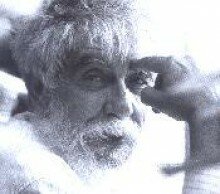
Born in Faro, the Algarve, in 1924, António Ramos Rosa moved to Lisbon in 1945, returning two years later to his hometown, where he was active in the recently created Movimento de Unidade Democrática, which opposed the Salazar regime. Arrested for his involvement in the group, he went back to the capital city to serve a three-month jail sentence. To make ends meet as a young man, both in the Algarve and in Lisbon (where he eventually settled for good, in 1962), he taught French and English and also became a notable translator, but from early on his great passion was poetry. He read it voraciously and became, as the years went by, an extremely prolific writer and critic of poetry.
In 1951 Ramos Rosa co-founded Árvore [Tree], which was one of the most significant literary magazines in Portugal during the post-war period, partly because of the attention it paid to international writing. For the magazine’s inaugural issue Ramos Rosa wrote an essay on René Char, whose poetry also featured in its pages, and it was French poetry (the work of Paul Éluard in particular) that galvanized him to begin producing his own work.
Ramos Rosa co-directed other magazines, where his own poems sometimes appeared, but it wasn’t until 1958 that he published his first book, O Grito Claro [The Clear Shout]. A steady stream of books has followed, with over fifty titles to the author’s credit. While the earliest poems (see, for instance, ‘I can’t postpone love’) reflect a political solidarity in opposition to the repressive regime, the poet’s work soon shifted toward its definitive pursuit of origins – our original speech, our original space, our original bodies, our original ignorance. Adjectives like ‘initial’ and ‘inaugural’ occur rather often, in combination with nouns such as ‘voice’, ‘breath’, ‘light’, ‘water’, ‘stone’, ‘tree’.
Does the original innocence that the poet invokes (and in which he exalts) exist anywhere except in language itself? He would certainly like to believe so. He does not propose language for its own sake, in substitution of reality, but as a means for arriving at a purer, primordial reality. He explains: “What I seek, in fact, is a space in which to breathe. I want my words to sketch a silent, aerial, initial landscape. Something seems to prevent me from forcing anything, from being heavy, as if the living word could only emerge from an excess of lightness and transparency!” Lightness gives rise to living words, which in turn create more lightness . . .
Six of the poems presented here are from The Book of Ignorance [O Livro da Ignorância], published in 1988, the same year the poet won the Prémio Pessoa, Portugal’s most prestigious prize for contributions in the arts and sciences. He has garnered other major awards, both national and international, and his poetry has been widely translated, especially into French.
Bibliography
Poetry in the original Portuguese (partial listing)
O Grito Claro, 1958
Viagem Através de uma Nebulosa1960.
Voz Inicial, 1960.
Sobre o Rosto da Terra, 1961.
Ocupação do Espaço, 1963.
Estou Vivo e Escrevo Sol, 1966.
A Construção do Corpo, 1969.
A Pedra Nua, 1972.
Não Posso Adiar o Coração, 1974.
Animal Olhar, 1975.
Ciclo do Cavalo, 1975.
Boca Incompleta, 1977.
A Nuvem sobre a Página, 1978.
Declives, 1990.
O Incerto Exacto, 1982.
Quando o Inexorável, 1983.
Gravitações, 1984.
Dinámica Subtil, 1984.
Volante Verde, 1986.
Clareiras, 1986.
No Calcanhar do Vento, 1987.
O Livro da Ignorância, 1988.
O deus nu(lo) , 1988.
Três Lições Materiales, 1989.
Acordes, 1989.
O Não e o Sim, 1990.
Facilidade do Ar, 1990.
Clamores, 1992.
O Navio da Matéria, 1994.
À la table du vent, 1995.
A Imobilidade Fulminante, 1998.
O Aprendiz Secreto, 2001.
French translations
Un Astre, tr. Michel Chandeigne, 1987.
Animal regard, tr. Michel Chandeigne, 1988.
Le Dieu nu(l), tr. Michel Chandeigne, 1990.
Le Livre de l’ignorance, tr. Michel Chandeigne, 1991.
Stries, tr. Michel Chandeigne, 1992.
Trois leçons matérielles, tr. Michel Chandeigne, 1992.
Clameurs, tr. Michel Chandeigne, 1993.
À la table du vent, tr. Patrick Quillier, 1995.
Le Cycle du cheval suivi de Accords, tr. Michel Chandeigne, 1998.
Respirer l’ombre vive, tr. Michel Chandeigne, 2000.
Spanish translations
Poemas, tr. Rodolfo Alonso, 1980.
Ciclo del Caballo, tr. Ángel Campos Pámpano, 1985.
Tres Lecciones Materiales, tr. Ángel Campos Pámpano, 1990.
El Arco de Hojas, tr. Eugenio Montejo, 1994.
Facilidad del Aire, tr. Clara Janés, 1998.
Links
In French
Michel Camus
‘Antonio Ramos Rosa: L’Ermite de Lisbonne’ (Biographical notes).
Notes de lecture
Reading notes on some translated works.
In Spanish
difusioncultural
‘António Ramos Rosa en la Poesía Portuguesa’ (A critical appraisal).
In Portuguese
Instituto Camoes
Critical articles and book reviews.

